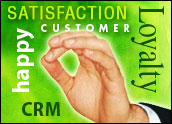
Making sure that every customer gets the personal touch may be fairly easy for the owner of a neighborhood bakery, but in a mass market of millions, making each customer feel like an individual is a formidable challenge. In the information age, tools like customer relationship management software make it possible for companies to apply a personal touch to the mass market — and that’s golden.
The drive to personalize mass marketing has spawned a big business, and it’s getting bigger. Companies spent US$9.15 billion on CRM software and services in 2008, a 12.5 percent increase from 2007, Gartner reported in July.
An even more favorable estimate of the global CRM market came from Forrester Research, which pegged it at $11.7 billion in 2008.
While CRM’s rate of growth may cool during 2009, experts foresee the market expanding by more than 5 percent annually for the next few years.
“Despite financial market volatility, the worldwide CRM market enjoyed its fifth consecutive year of double-digit growth in 2008 as businesses continued to invest in solutions across all subsegments,” said Sharon Mertz, a research director at Gartner.
It’s not just the ability to reach customers in a more personalized context that is driving CRM, however. The technology also provides the means to conduct almost all marketing functions more efficiently. That provides vendors with a huge potential market. With such a large pie, small slices will still be available to smaller CRM vendors, while a handful of market leaders will compete aggressively in the future.
Growth depends on two factors: First, software and services vendors must ensure they continue to adequately provide the basics of CRM in such areas as order processing, billing, lead generation and managing customer data. Second, CRM providers must adapt their offerings to cultural and technological changes, such as social networking and the increasing use of mobile devices.
Sticking to the Basics
Sluggish economic times are no excuse for cutting back on CRM. In a business downturn, any leverage that can cultivate customers is more important than ever.
“Core CRM is essential for effectively interacting with your customers,” Michael Fauscette, group vice president for software business solutions at IDC, told CRM Buyer.
Some CRM projects may be deferred or canceled in 2009, conceded William Band, vice president for business process and applications at Forrester, but “customer-oriented” executives still find the need for CRM compelling.
“Our research confirms that buyers today are still most interested in core customer management functionalities like sales, order capture and customer service,” Band told CRM Buyer. “These categories are viewed as most critical to their business success, and these solutions are available, mature and stable.”
Most businesses familiar with CRM are more interested in holding onto their existing customers than generating lots of new customers, based on Forrester’s analysis of the CRM market for 2009 and beyond. That objective triggers the need to use CRM for greatly improving the customer experience.
“Our analysis shows that good customer experience is highly correlated to customer loyalty, but customer-facing touchpoints at many organizations are clearly broken,” Band notes in Forrester’s CRM report.
Adoption of CRM Is Critical for Growth
If the notion that the customer is king is still valid, then serving the king properly these days means paying attention to fast-paced changes in customer lifestyles.
One key example is the rise of social networking.
“When you layer in social CRM and the trend of interacting with customers when, where, and how they want to — rather than using the old model of control by the company — it’s even more essential to keep working through the CRM deployment process,” said IDC’s Fauscette.
Seventy-five percent of U.S. adults online now use social tools to connect with each other compared with 56 percent in 2007, Forrester’s 2009 outlook revealed. Because it is relatively new, the impact of social CRM is a bit hard to gauge at this point.
“As might be expected, the jury is out on the emerging phenomenon of social CRM,” said Band.
While the concept is starting to capture the imagination of decision-makers, business executives ranked customer community platforms and customer forum solutions far lower in priority than other customer management solutions in a recent Forrester survey.
Lifestyle changes such as mobile computing also are significant.
“The movement to a mobile workforce and the use of mobile computing platforms for interacting with CRM systems, especially in the sales function,” is yet another important development noted Fauscette.
“The demand for mobile customer management solutions has now passed a tipping point,” observed Band. “Organizations of all sizes are investing aggressively to support a mobile workforce, and vendors without a sound mobile offering will be discounted from consideration, even by smaller businesses.”
Competitive Outlook: Majors and Niche Providers
Currently, the CRM landscape is dominated by a handful of providers that collectively account for 60 percent of the market, according to Gartner.
“Some of the top vendors in the market are SAP, Oracle, Salesforce.com and Microsoft, with SAP having the largest market share in 2008,” said Gartner’s Mertz.
Oracle’s share has been spurred by its on-demand CRM offering, Gartner reported.
Salesforce.com crossed the $1 billion revenue mark in 2008 and is expanding both its CRM offerings and its geographic reach.
Microsoft, with both on-demand and partner-hosted offerings, is growing nicely — especially through its partner channel, said Mertz.
Along with Oracle, SAP and Salesforce.com, IDC’s Fauscette includes Avaya in his top tier, principally for its presence in the customer support and call center market.
While the large players may continue to hold strong positions, it is by no means certain that they will continue to enjoy their current CRM market shares as they compete with each other and with smaller firms. Many of the smaller vendors, with expertise in certain technologies or a sharp focus on specific tasks will continue to grab “niche” market business in the CRM space.
For example, one technical development that vendors must embrace is Software as a Service (SaaS).
“Software as a Service continued to drive the market forward, representing nearly 20 percent of total CRM software market revenue in 2008, up from just over 15 percent in 2007,” reported Mertz.
Salesforce.com, Blueroads, RightNow Technologies and NetSuite pioneered SaaS for CRM, noted Band, driving Oracle and Microsoft to launch similar offerings.
Open source technologies will also play a key role moving forward.
The future for CRM, both for users and vendors, appears to be bright. That said, vendors will need to be nimble to accommodate changing requirements while still providing primary marketing support.
It may be alluring to veer toward emerging technologies such as social CRM and cloud computing. Yet in offering the best service to potential CRM customers, vendors will need to pay attention to one old-fashioned market rule: Keep your ear to the ground.























































I have experience of the CRM systems of a major online retailer, which had evolved over nearly a decade. Our biggest CRM issue was proliferation of CRM systems. We had a system for handling customer support, queries and sales, one for analysis and segmentation, one for marketing to existing customers and one for website personalisation. In true "best of breed" fashion, each did it’s own niche job very well, but system proliferation increases costs (in system maintenance and in staff training). Arguably worst of all, it also results in a number of versions of "the truth" of customer behavior. For many businesses, I could see the avoidance of CRM system proliferation driving them towards the larger vendors and away from the niche providers.
Anne Currie
http://www.workingprogram.com
I can advise here the program for business to whom interestingly! Itself I use to it and I do not complain. Very much simplifies work…